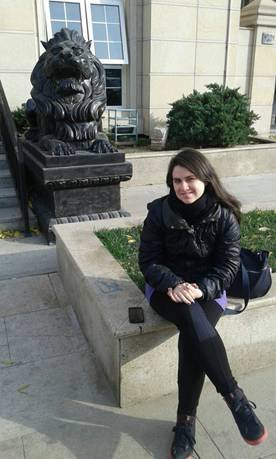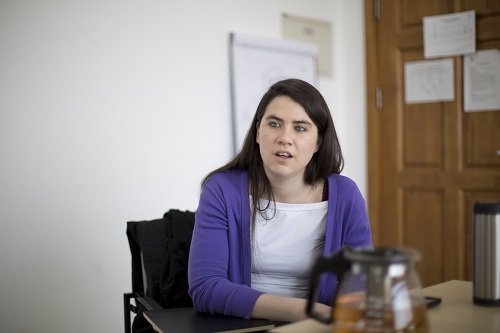Argentinean Student Dafne Esteso on How Her Studies Reflect Sino-South American Relations

This post is sponsored by the Beijing Normal University School of Social Development and Public Policy, an international program comprised of students and faculty from around the world. Visit www.ssdpp.net.cn/en to find out more.
“I’ve been a curious person ever since I was born,” says 31-year-old Argentinean Dafne Esteso. “At university I attended some classes about China and that was the moment when I became interested.” After earning a degree in International Relations, she went to work for the Argentinian government in the field of science and technology collaboration, and started to see increasing cooperation with China in her country. Dafne has finally been able to satiate this curiosity by coming to study at Beijing Normal University’s School of Social Development and Public Policy. “China is really important to my country right now,” Dafne says. She hopes her experience in Beijing will help her to better understand China’s perspective of the world. The Beijinger spoke with Dafne about her past four months as a master’s student in Beijing.
What’s the general impression of China in Argentina?
In my country and in Latin America in general, we are changing the perspective. During the 1990’s our country had a very good alliance with the States. But then that changed so we [now] pay much more attention to China and Russia in a political and economic sense. China is [starting to have more of a presence] in our country. When the Chinese president was in [there] the media paid a lot of attention. I think people are curious about [China] because they have suffered a lot from the consequences of the alliance with the States both in an economic way as well as from a cultural point of view. So China is different and we have a good cooperation – at least for [now].

How about for you personally coming here studying. Have your perceptions changed?
Personally for me it was a very big change in my life. It’s very different and a different culture. At this moment I’ve been here for four months, I love Beijing. I have weeks that I’m really excited about the decision to come here and then have weeks that I feel like I don’t know what I’m doing. But, in general the experience has been good.
[Here in China] we have to deal with some bureaucratic things, but I’m from Argentina and in Argentina we have to deal with the same things so I’m used to it. Maybe that seems like a problem,but after you deal with bureaucratic things you feel that you can do anything because you are more prepared. It’s something all people should go through, just to have more experience, I mean its life.
I feel like I’m not here just for academic reasons which are obviously important, but also because I’m in a different country. I’m in a very different culture from mine. I think I’m learning and at the end I will have learned a lot from the experience of living abroad in a very different culture.
What’s the social life like on campus?
Here on campus I have a lot of relations with my master’s degree mates. I’ve been here for four months and we’ve become very close. English is not my native tongue so I have that boundary. I like speaking Spanish with people from my country because I feel more relaxed and still with these new people I’ve met I’ve become very close with them so that’s really nice. Through them I’ve had a chance to meet other people. A lot of people who have entered the master’s degree program have been in [Beijing] so they know the city better than me and know more people so it’s a good opportunity to meet more people.

How have you found the academics so far?
I think that the methodology is quite different. I think the main reason is that we are full time students. In my country most of the people who study work at the same time because you have to survive, you have to eat. Because the public university is the best in my country you can get a good education, but you still have to work [to support yourself] – so you attend classes in the evenings and work during the day. Here you are a [just a] full-time student.
How did you find out about this program?
I applied through the Ministry of Education of Argentina. I would say that China and Argentina have a lot of cooperation not only in science and technology but also in education. I had three options – the first was another program more related with Chinese culture. Finally the government chose this program for me because of my background and my experience working in the government. [So] this program made more sense. I wanted to know some different perspective about how China is perceiving the [world].

In my country I think we should work on [understanding China’s perception]. Because now China is becoming very important to Argentina. I’m glad that the government chose this program for me … I think it makes sense because of my background and experience.
I [also] think the most interesting thing [about studying here] is the social capital – this is very important because I am far away from my home country. I’ve been here for four months and I’ve met a lot of people. The academics will be important at the end, but I think the social capital is also very important.
Photos: Courtesy of Beijing Normal University



